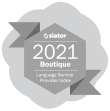How to Choose a Translation Company
In this article, we present valuable criteria and suggestions which can help you choose the most suitable Translation Company for your specific Translation and Localization needs

How to Choose a Translation Company
We live in a globalized world that is continuously breaking the boundaries of the old and embracing new technologies, new opportunities and means of constructing and expressing economic and business growth.
This has paved the path towards a steady interdependence of economies and cultures, enhanced by cross-border trade and investment flows of goods, services, technology and information, highlighting the stringency of language as an inextricable link between business mediums of communication.
According to Nigel Holden in “The treatment of language and linguistic issues in the current English-language international management literature”(1987), if we were to talk about language in the context of business management almost three decades ago, only a handful of authors were truly highlighting the paramount role and complexity of language at the heart of any business.
However, Finnish organizational theorist Rebecca Piekkari sheds an innovative light on this concept, interpreting language not only as a decisive factor, but also as a key element in organizational communication and business creation, highlighting that
"language permeates every facet of international business, (…) especially from those involved in global activities in any form."
In this article we delve further into this concept, presenting it from a multitude of standpoints: the types of translation-industry specific Language Service Provider (LSP) options, suited to a variety of requirement and client profiles, as well as the main factors that influence the choice of LSP for different business sectors and fields, also providing an insight into the features of a competitive LSP that cater for the quality and turnaround demands of customers worldwide.
Types of Language Service Providers

Freelance Translators
Freelance Translators are self-contracted linguists who perform translation tasks independently, bearing direct responsibility not only for their main linguistic activity, but also with regards to marketing, accounting, contract negotiation, customer support and communication.

Single-Language Vendors (SLVs)
A Single-Language Vendor is usually identified as a company with a portfolio of translation services performed into one language, encompassing file preparation and localization engineering, translation, editing, proofreading; project management and internal Quality Assurance; desktop publishing and file formatting.

Multiple-Language Vendors (MLVs)
Multiple-Language Vendors represent companies with a portfolio of translation and localization services performed into multiple language combinations, providing flexible solutions to customer translation and localization demands through native subject matter experts in all languages requested, spanning a multitude of fields of activity.
Key-features of competitive LSPs
Let us take a look now at the key features of competitive LSPs and observe the main criteria which differentiate and influence successfully choosing a Language Service Provider.
Multilingual Translation and Localization Services Portfolio
It is safe to say that a multilingual translation and localization portfolio represents a best-selling feature of any Language Service Provider, as it can ensure consistent translation methodology in a wide range of languages, abiding by strict and specific quality standards and efficient coordination between delivery schedules.
The service portfolio of Multiple-Language Service Providers encompasses customizable translation and localization such as: file preparation and localization engineering; translation, editing, proofreading; project management and internal Quality Assurance; desktop publishing and file formatting, also exhibiting long-term benefits such as the multitude of subject matter experts and flexible project management solutions ensured by dedicated project managers for each individual translation or localization order.
SMEs (Subject Matter Experts)
A subject matter expert (SME) is an individual demonstrating outstanding knowledge or expertise in a particular topic or domain of activity.
In regard to translation industry Subject Matter Experts, let us take one highly specific example in the translation industry, namely medical or life sciences translations in order to facilitate our discussion.
In the medical/life sciences translation sector, quality is of the utmost importance and it requires superior knowledge and command of specific terminology and target audience sensitivities and unequivocal conformity with the EMA (European Medicines Agency) and MDD/MDR (Medical Device Directive/Medical Device Regulation).
The improper use of unprofessional or low-skilled translation vendors for such specific linguistic endeavours more often than not results in:
-
Misinterpretations or even accidents due to improper terminology use.
-
Ineffective patient care strategies determined by faulty content.
-
Loss of money and turnaround time due to sub-par content that needs further revision.
A Language Service Provider boasting a portfolio of subject matter experts in specific fields such as the medical example provided sets the bar high and constitutes a far better choice resulting in high-standard and quality translation output and compliance with customer requirements, avoiding the recurrence of such issues and ensuring standard levels of consistency and accuracy in any field-specific translation project.


Thorough Project Management and internal Quality Assurance processes
Just like everything we do in our day-to-day life, translation project management is all about the coordination between the involved entities, achieved through: detailed planning, teamwork, a proactive approach to problem-solving and, most importantly, quality control.
From the outset of having a specific translation and localization order assigned, to assessing the material to be translated and agreeing on the time-frames and deadlines, a competitive Language Service Provider exhibits a thorough project management process, engaging a dedicated manager that carefully processes each individual request from the client, for the specific market and field they are aiming for.
The thorough management process is backed up by a precise set of quality criteria ensured by the internal Quality Assessment workflow and ISO certifications, tailoring and differentiating each translation product from the others in terms of terminology, guidelines and target-audience compliance.
Flexibility towards a wide-range of content types
Another key feature of a competitive Language Service Provider is represented by its flexibility towards catering to client orders in a wide range of content types ranging from: generic documents to video game and website content, technical spreadsheets, mobile applications content, technical manuals, user interface content, audio and video subtitling content, scripts, marketing publications, product descriptions to highly specific EMA-regulated medical template content, patient descriptions, clinical trials to specific financial, legal or EU-related content.
The ability to provide tailored translation and localization solutions for individual market requirements and specific client queries represent a valuable asset that sets the bar high in the industry and differentiates LSP choices in terms of quality and professional output.
Ability to scale
For a Language Service Provider offering a multilingual portfolio of translation and localization services, the ability to scale represents an intrinsic capacity to handle volume and growth, which is a beneficial and long-term asset.
LSPs exhibiting the ability to scale and handle large volumes of translation orders over tight time-frames are always top-ranking in terms of customer choice, providing specific solutions to their linguistic queries with highly competitive turnaround times.
Technical prowess and versatile command of CAT tools
The translation industry is all about blending linguistic and non-linguistic assets and technical know-how, harnessing state-of-the art translation management technology.
The efficient use of Translation Management Systems (TMS) or professional Computer Aided Translation (CAT) tools enables the rapid and easy sharing of relevant documentation for project management purposes, saving considerable time and effort in comparison to manual processing.
This valuable technical prowess, backed up by a professional command of state-of-the-art translation management software and tools ensures top-notch translation and localization service output, while also facilitating the creation of customizable workflows for localization purposes, easy file submission processes, as well as project monitoring and rapid approval of quotes costs.
Transparent pricing and TM leverage options
Of course, it goes without saying that from the plethora of Language Service Providers exhibiting all the aforementioned features, a decisive factor which can influence the choice of LSP is the price matrix.
Performing top-quality translation at the lowest industry price might sound like an ideal scenario, however a Language Service Provider that can offer competitive prices, as well as the possibility to save money in relation to volumes through Translation Memory (TM) and Computer-Aided Translation (CAT) tool management, represents the best option in order to cover entirely new content while cutting down costs on existing or repetitive content.
Data Security
The issue of data management and security with regards to the translation industry has been a constant, top-ranking topic, especially when touching upon the aspect of company data breaches.
Information confidentiality and security represent key requirements and expectations from professional Language Service Providers, and the industry specific ISO certifications regarding sensitive data processing occupy a central position in any LSP’s portfolio of features.
Conclusion
In this article we touched upon what sets competitive Language Service Providers apart from the plethora of LSPs in the industry, from the standpoints of typology, adaptability to a variety of requirements and client profiles, as well as the main factors that influence the choice of LSP for different business sectors and fields, also providing an insight into the features that cater for the quality and turnaround demands of customers worldwide.
We can draw the line and safely say that in order to effectively communicate and convey a coherent, politically correct and accurate meaning to the global audiences targeted through translation and localization services, choosing the most suitable Language Service Provider must be a priority.
So let us reiterate the concept highlighted by Rebecca Piekkari at the beginning of our discussion, namely that “language permeates every facet of international business”, and with this be reminded that for any kind of business domain or field of activity to thrive, the linguistic architecture must have a solid foundation.
References
Holden, N. (1987). The treatment of language and linguistic issues in the current English-language international management literature. Multilingua Journal of Cross-Cultural and Interlanguage Communication, 6(3), 233–246.
Piekkari, R., Welch, D., & Welch, L. S. (2014). Language in international business: The multilingual reality of global business expansion. Cheltenham: Edward Elgar Publishing.










